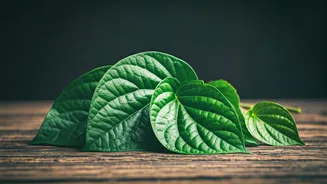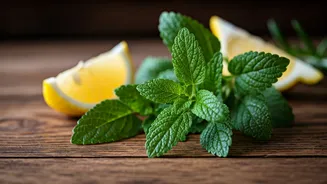Betel Leaf Basics
Betel leaves, scientifically known as Piper betle, have been an integral part of Asian cultures for centuries, prized for their medicinal properties and
cultural significance. Originating in South and Southeast Asia, these heart-shaped leaves are usually chewed with areca nut and slaked lime, creating a combination known as 'paan'. Beyond their use in this cultural practice, betel leaves are a powerhouse of bioactive compounds, including vitamins, minerals, and antioxidants. They are known to possess anti-inflammatory, antibacterial, and antioxidant characteristics. The distinct flavor and aroma are due to the presence of eugenol, a crucial component that contributes to its therapeutic effects. These qualities have resulted in their use in various traditional medicinal practices, including those focused on oral health, digestive support, and wound healing. The versatility and rich composition of betel leaves make them a subject of interest in modern research, with emerging studies exploring their potential applications in various aspects of health and wellness. This section will delve into the many benefits of this unassuming leaf.
Blood Sugar Support
Betel leaves can be a helpful addition to a balanced diet when considering how to maintain healthy blood sugar levels. Studies suggest that betel leaves may help improve insulin sensitivity, which is vital for glucose metabolism. These leaves contain compounds that can help the body utilize glucose more efficiently, potentially preventing blood sugar spikes after meals. Traditionally, people have consumed betel leaves to help manage blood sugar levels, and modern research supports these practices by indicating a link between betel leaf consumption and reduced blood glucose levels. The antioxidants in betel leaves also play a role; they can reduce oxidative stress, which can worsen insulin resistance. Incorporating betel leaves into your lifestyle, however, should be done with appropriate guidance from a healthcare professional, especially if you are managing diabetes or other related conditions. Remember, betel leaves are a complementary element and not a replacement for medical treatments.
Oral Health Benefits
Betel leaves have been shown to provide significant benefits for oral health, with their antibacterial properties helping to fight against harmful bacteria that cause dental issues. Chewing betel leaves can freshen breath and reduce bad odors due to their volatile compounds, which neutralize odor-causing bacteria. Also, betel leaves' antiseptic qualities can help reduce plaque buildup and protect against cavities. They are often used in traditional remedies to treat mouth ulcers and gum diseases. Furthermore, the act of chewing betel leaves can stimulate saliva production, which naturally cleanses the mouth by washing away food particles and neutralizing acids. It's a natural way to support good oral hygiene, and the use of betel leaves can lead to healthier gums and stronger teeth, reducing the need for treatments. The natural components in betel leaves make them a valuable resource for maintaining a healthy mouth.
Liver Protection
The liver is a vital organ in the body, and betel leaves are thought to play a role in supporting its functions. The antioxidants present in betel leaves can help protect liver cells from damage caused by free radicals, which can lead to inflammation and disease. Studies have revealed that betel leaves might have protective effects against liver damage caused by toxins. Some research suggests that betel leaves can support the liver's natural detoxification processes, helping to remove harmful substances from the body. Betel leaves can aid in reducing liver inflammation, and can also help with conditions such as fatty liver disease. Considering the modern lifestyle, which often includes exposure to toxins and stress, adding betel leaves to your diet may provide an additional layer of support for liver health. Always consult a healthcare professional for dietary advice.
Antioxidant Powerhouse
Betel leaves are brimming with antioxidants, which are crucial in protecting the body against the detrimental effects of free radicals. Free radicals are unstable molecules that can damage cells and contribute to aging and a range of health issues. The antioxidants in betel leaves, such as eugenol and other phenolic compounds, neutralize these free radicals, helping to prevent cellular damage and reduce the risk of chronic diseases. By incorporating betel leaves into the diet, one can increase their antioxidant intake, promoting overall health and well-being. These antioxidants help prevent cell damage and support the body's natural defense mechanisms. Regularly consuming betel leaves can have benefits, including reducing inflammation and improving skin health. Therefore, these leaves act as a natural way to combat oxidative stress and promote a healthier lifestyle.
Wound Healing Properties
Betel leaves have traditionally been used for wound healing, owing to their antiseptic and anti-inflammatory properties. These leaves can help clean wounds, reducing the risk of infection. The compounds in betel leaves promote tissue repair, which can speed up the healing process. They can be applied topically to minor cuts and abrasions to encourage faster healing. Betel leaves are known to reduce inflammation around wounds. The presence of eugenol, an essential oil found in betel leaves, has pain-relieving effects. Therefore, in traditional medicine, betel leaves were used for dressing wounds, reducing pain and encouraging rapid recovery. Using betel leaves for wounds is a natural way to support healing and reduce scarring. Applying betel leaves can also help minimize the chances of infection, promoting rapid recovery and ensuring the skin heals effectively.
Digestive Aid
Betel leaves can assist with digestive issues, thanks to their carminative properties that help relieve gas and bloating. The leaves stimulate the secretion of digestive enzymes, which enhance the breakdown of food and absorption of nutrients. Chewing betel leaves after meals can support digestion and prevent indigestion. These leaves can also help reduce stomach acidity. In traditional medicine, betel leaves were often used to treat digestive ailments such as stomach aches and constipation. By improving gut motility and supporting the gut's natural functions, betel leaves assist in maintaining a healthy digestive system. Including betel leaves in your diet can encourage a healthy gut, reducing discomfort and promoting overall well-being. By incorporating them regularly, one may experience an enhanced digestive experience.






















